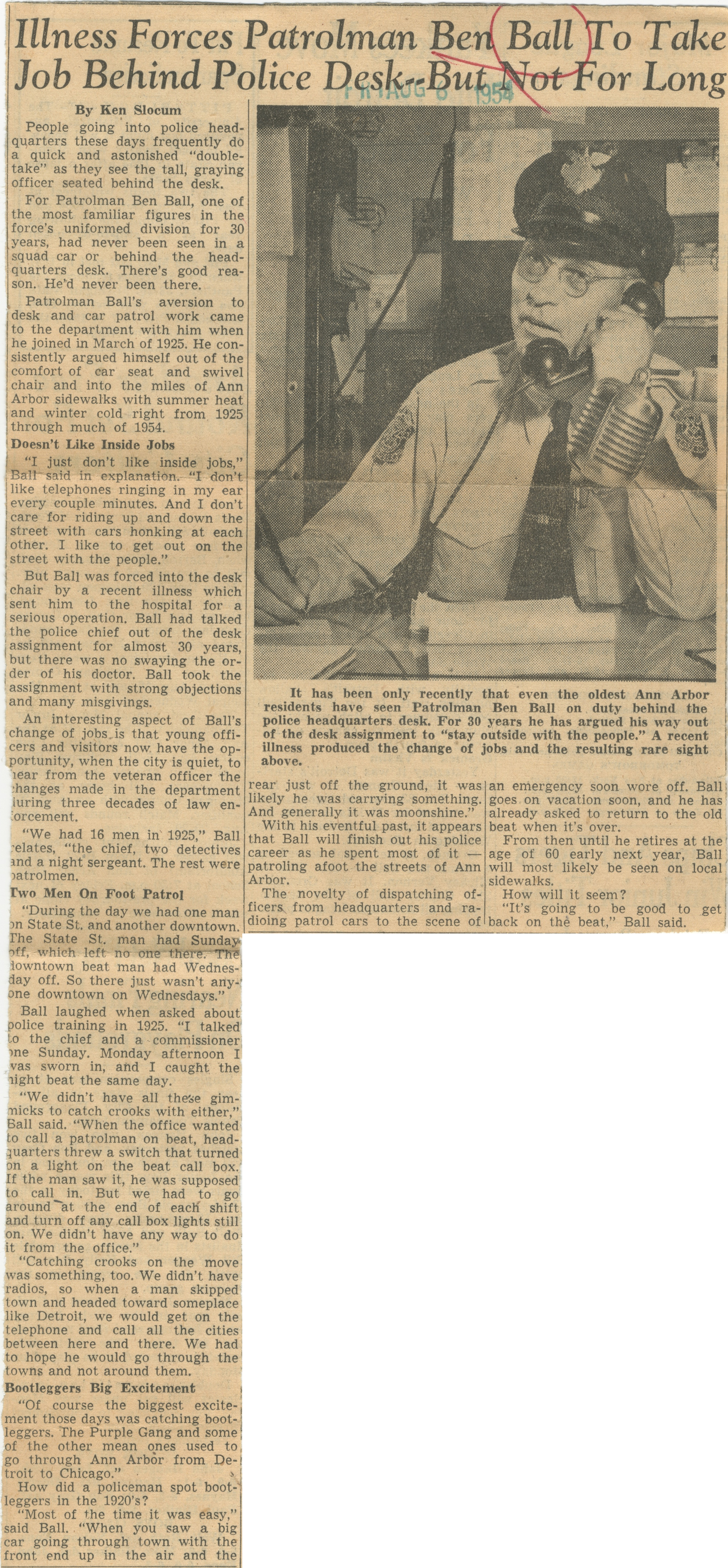Illness Forces Patrolman Ben Ball To Take Job Behind Police Desk -- But Not For Long

Illness Forces Patrolman Ben Ball To Take Job Behind Police Desk--But Not For Long
By Ken Slocum
People going into police headquarters these days frequently do a quick and astonished "double-take” as they see the tall, graying officer seated behind the desk.
For Patrolman Ben Ball, one of the most familiar figures in the force's uniformed division for 30 years, had never been seen in a squad car or behind the headquarters desk. There's good reason. He‘d never been there.
Patrolman Ball's aversion to desk and car patrol work came to the department with him when he joined in March of 1925. He consistently argued himself out of the comfort of car seat and swivel chair and into the miles of Ann Arbor sidewalks with summer heat land winter cold right from 1925 through much of 1954.
Doesn’t Like Inside Jobs
"I just don’t like inside jobs," Ball said in explanation. “I don't like telephones ringing in my ear every couple minutes. And I don’t care for riding up and down the street with cars honking at each other. I like to get out on street with the people.”
But Ball was forced into the desk chair by a recent illness which sent him to the hospital for a serious operation. Ball had talked the police chief out of the desk assignment for almost 30 years, but there was no swaying the order of his doctor. Ball took the assignment with strong objections and many misgivings.
An interesting aspect of Ball's change of jobs is that young officers and visitors now have the opportunity, when the city is quiet, to hear from the veteran officer the changes made in the department during three decades of law enforcement.
“We had 16 men in 1925,” Ball relates, “the chief, two detectives and a night sergeant. The rest were patrolmen.
Two Men On Foot Patrol
"During the day we had one man on State St. and another downtown. The State St. man had Sunday off, which left no one there. The downtown beat man had Wednesday off. So there just wasn’t anyone downtown on Wednesdays.”
Ball laughed when asked about police training in 1925. “I talked to the chief and a commissioner one Sunday. Monday afternoon I was sworn in, and I caught the night beat the same day.
"We didn't have all these gimmicks to catch crooks with either,” Ball said. “When the office wanted to call a patrolman on beat, headquarters threw a switch that turned on a light on the beat call box. If the man saw it, he was supposed to call in. But we had to go around at the end of each shift and turn off any call box lights still on. We didn’t have any way to do it from the office."
"Catching crooks on the move was something, too. We didn't have radios, so when a man skipped town and headed toward someplace like Detroit, we would get on the telephone and call all the cities between here and there. We had to hope he would go through the towns and not around them.
Bootleggers Big Excitement
“Of course the biggest excitement those days was catching bootleggers. The Purple Gang and some of the other mean ones used to go through Ann Arbor from Detroit to Chicago.”
How did a policeman spot bootleggers in the 1920’s?
"Most of 'he time it was easy," said Ball. "When you saw a big car going through town with the front end up in the air and the
It has been only recently that even the oldest Ann Arbor residents have seen Patrolman Ben Ball on duty behind the police headquarters desk. For 30 years he has argued his way out of the desk assignment to “stay outside with the people.” A recent illness produced the change of jobs and the resulting rare sight above.
rear just off the ground, it was likely he was carrying something. And generally it was moonshine."
With his eventful past, it appears that Ball will finish out his police career as he spent most of it -- patroling afoot the streets of Ann Arbor.
The novelty of dispatching officers from headquarters and radioing patrol cars to the scene of
an emergency soon wore off. Ball goes on vacation soon, and he has already asked to return to the old beat when it's over.
From then until he retires at the age of 60 early next year, Ball will most likely be seen on local sidewalks.
How will it seem?
"It's going to be good to get back on the beat," Ball said.